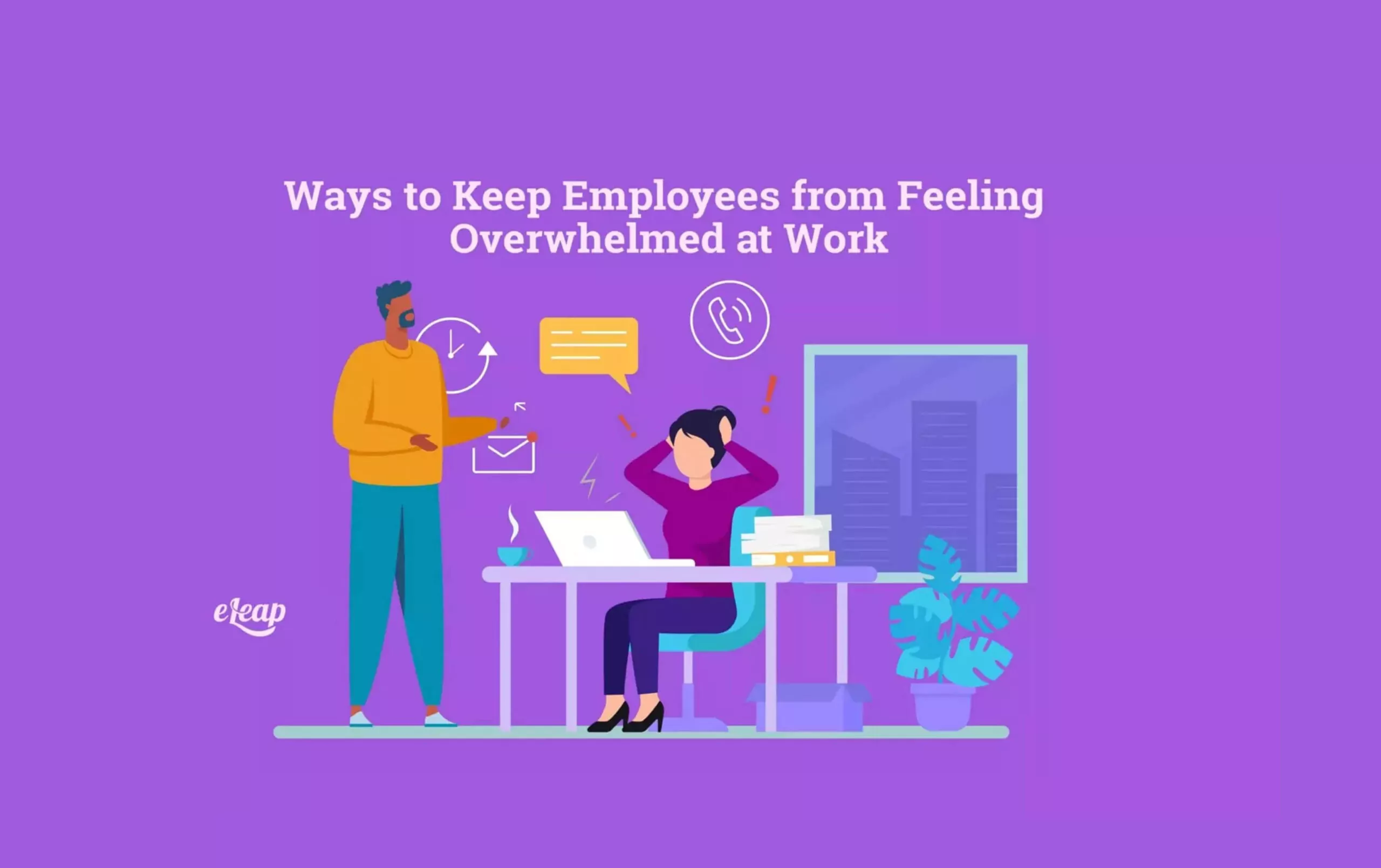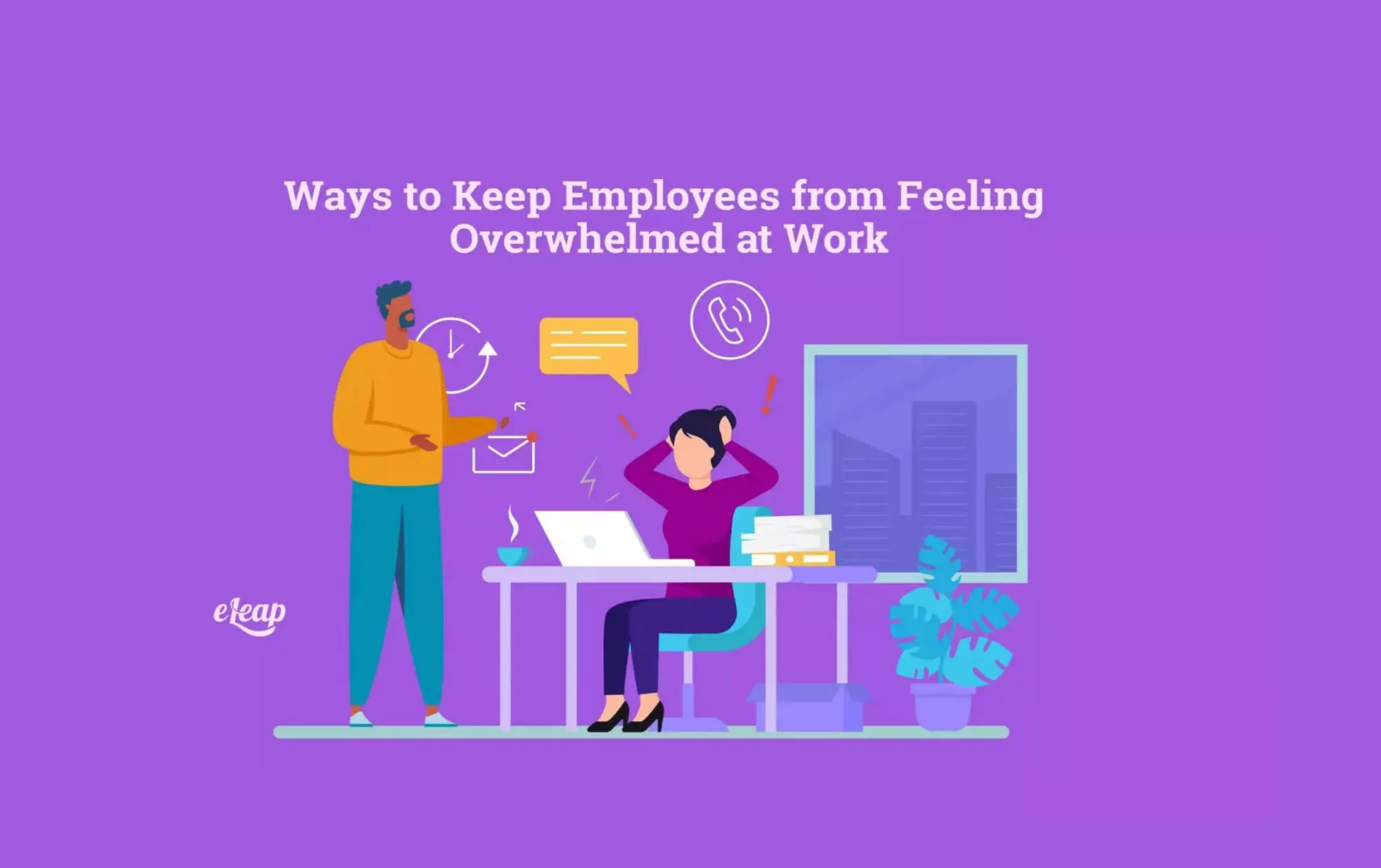Ways to Keep Employees from Feeling Overwhelmed at Work

Are your employees feeling overwhelmed at work? Many factors can contribute to the feeling. Feeling rushed to complete projects and unrealistic expectations, sometimes self-imposed, can lead to that overwhelmed feeling. Stress from all aspects of life can combine and affect everything from motivation and productivity to physical and mental health.
Burnout and Stress
According to the World Health Organization (WHO), burnout is an occupational phenomenon, and the organization now recognizes it as a syndrome. As an occupational phenomenon, burnout is directly related to stress at work. The symptoms of burnout include mental distance from the job, lack of energy, negative feelings about work, and less productivity. Long-term stress has the potential to lead to burnout.
At times, pressure inspires creativity and productivity. Think of how adrenaline will give you a burst of energy; pressure can have the same effect. However, continuously feeling overwhelmed at work takes an immense toll on your health.
If you aren’t concerned about burnout, you simply need to look at the statistics, and you will be. In 2018, a Gallup poll discovered that 67% of employees feel burned out. Of that percentage, 44% say they feel burned out at least sometimes, and 23% say they feel burned out often or even always.
It’s important to remember that high-performing workers can experience feelings of overwhelm too. In one study, the percentage of engaged employees who reported feeling burned out was 20%. It’s no surprise that burnout contributes to absences, turnovers, and it costs companies billions of dollars yearly.

Stress Is Everywhere
While work may be a large portion of stress for some, it isn’t the only cause. Pressure in our personal lives is growing. Americans are said to be the most stressed people in the world. Constant, unrelenting stress leads to burnout.
Stress and burnout can lead to various physical and mental issues. Some of those include high blood pressure, heart disease, Type 2 diabetes, and insomnia.
Employers aren’t in control of every factor that causes employees to feel overwhelmed at work. Leaders can help their employees learn to adjust and develop coping skills to handle pressure.
What Leaders Can Do to Help Employees Who Are Feeling Overwhelmed at Work
Modern companies rely on their employees for creativity, agility, collaboration, and productivity. To perform at peak capacity, employees need to be in top physical and mental health. However, when employees are burned out or overly stressed, everyone involved faces difficulty.
Leaders who want to present a caring attitude toward their employees need to recognize how stress affects the staff. They should address the unrelenting pressure that their employees feel.
Here are some tips to get started addressing the pressures of stress in the workplace.
Know the Signs of An Employee Feeling Overwhelmed at Work
Be aware that employees may not always recognize their own stress-induced behaviors. Leaders must recognize the warning signs indicating overpowering stress levels. Missing deadlines, decreased productivity, increased tardiness, and absences are red flags. An employee who increasingly isolates themselves exhibits irritability, makes errors, experiences health issues like headaches, or begins complaining may also be struggling with overwhelming feelings.
When employees are feeling overwhelmed at work, help them to take steps to alleviate their feelings of stress. Encourage open communication as well as routine breaks from their desks. If they aren’t able to handle the stress on their own, offer professional services to help them learn stress management skills
Periodic Check-ins with Employees Helps Gauge Workload and Stress Levels
You can check in with employees at any time. An excellent time to talk to them about their workload and stress level is at your weekly or monthly check-ins. Employees may feel uncomfortable discussing challenges at first. Often, they feel that admitting to issues makes them look less competent.
Leaders must strive to create a psychologically safe environment. When the environment is psychologically safe, employees feel supported by management. Feeling supported gives employees the confidence to be vulnerable and share their struggles in the workplace.
Flexible Scheduling or Working from Home Helps Alleviate Feeling Overwhelmed at Work
Allowing flexible scheduling allows employees to have more control over their time which can greatly reduce stress. When you allow workers to work from a different location, your employees feel more trusted to complete their work on their own.
Employees who have this kind of flexibility often feel less stress in other areas of life. Avoiding a commute to work, for example, gives them more time to focus on work. The added time allows for a deeper focus on tasks, which helps to increase productivity.
If you are allowing employees to work from home, remember to keep those team members connected to the company. Take care to keep from falling into the trap of “out of sight, out of mind” with those employees. Work to remind them they are a vital part of your whole team.
Employees Need to Be Recognized for Their Efforts
To help employees avoid feeling overwhelmed at work, show them the recognition they’ve earned. Everyone needs to feel appreciated for their efforts. Waiting for the next performance review isn’t necessary. Feel free to praise your employees in the moment.
You can show appreciation to your employees in various ways. Performance reviews are the most traditional way to provide praise. However, taking the time to voice approval and appreciation throughout the year will help to build your team’s confidence, which will improve productivity.
Getting to know your team on a more personal level will help you provide the appropriate feedback for your team members. Your introverted employees may be terrified of public recognition, while the experts
Spend Time Reviewing Task Lists With Employees
As a manager, you may not be aware of all the tasks your employee has on their plate. That means you could be giving them more work than they can do. High-performing employees may not want to admit they feel overloaded.
Assist your team with prioritizing their tasks. Allow them to delegate among their team members. If necessary, help them feel comfortable removing items from their workload.
Help your team focus on their largest priorities using an Objectives and Key Results (OKR) performance management solution. Using OKRs helps you to set objectives that will have the most effect on the company.
Another helpful suggestion is assisting employees with setting healthy boundaries. Having good boundaries will help them avoid feeling overwhelmed at work by helping them manage both time and stress.
Emphasize Employee Wellbeing and Wellness
With today’s overwhelming, stressful work environments, facilitating wellness programs for your workers is more important than ever. Incorporating wellness programs into your company culture lets your employees know that you care about them as people, not just as cogs in your business wheel.
Talk to your employees to discover which wellness programs they feel would be most beneficial for your company. Focusing on wellness programs gives your employees a way to work through stress and avoid burnout and feeling overwhelmed.
Wellness can incorporate meditation as well as movement. There can be workshops, classes, and discussion panels as well. These opportunities can happen in a live, interactive setting or a virtual setting.
Encourage Employees to Build A Positive, Social Community
Creating a positive environment for employees begins with small efforts. A simple word of thanks for offering assistance with a task or publicly expressing appreciation to an employee helps to build a positive environment.
Social interactions can include going to lunch together as a team, providing breakfast for the morning meeting, or having a group exercise or meditation experience. Ensure you are including those employees who choose to work remotely when you promote social interactions. One idea for including the remote population is to provide them with a gift card for their favorite coffee or tea and having a virtual coffee break.
When facilitating community-building activities, remember they are designed to decrease stress. Make sure that your efforts don’t cause employees to feel pressured.
Team-building activities of various types are available for you and your employees. You might consider a team-building retreat, a ropes course, or even creating a sports league for your office. Even a casual Friday with a pizza party provided by the boss can become a team-building activity. Consult your team and incorporate their ideas into your planning as well.
Wrapping It Up
It’s crucial that the leaders on your team recognize the signs of feeling overwhelmed or burned out. If a team member suddenly starts coming to work late or not at all, chances are good their stress level is too high. Encourage them to talk to you or to one of the members of the team.
Sometimes when an employee feels overwhelmed at work, they are hesitant to share their struggles with other team members. Encouraging your team to build a community atmosphere can help them feel more confident sharing their struggles with each other.
Focusing on wellness helps people to see you appreciate them away from the office as well as at it. Use the tools that are available to help you guide your employees through stress management.